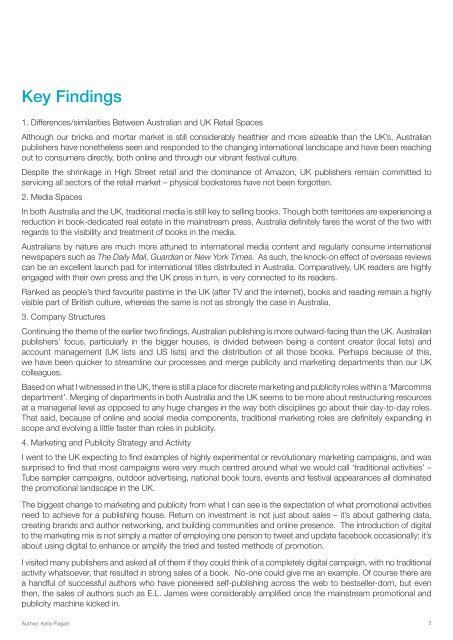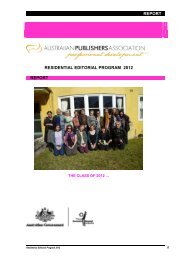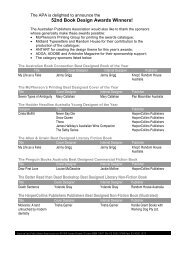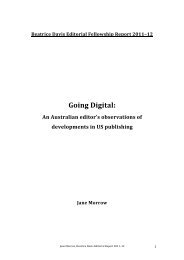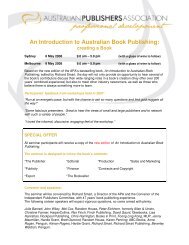Report 2013 - Kelly Fagan HERE - Australian Publishers Association
Report 2013 - Kelly Fagan HERE - Australian Publishers Association
Report 2013 - Kelly Fagan HERE - Australian Publishers Association
You also want an ePaper? Increase the reach of your titles
YUMPU automatically turns print PDFs into web optimized ePapers that Google loves.
Key Findings<br />
1. Differences/similarities Between <strong>Australian</strong> and UK Retail Spaces<br />
Although our bricks and mortar market is still considerably healthier and more sizeable than the UK’s, <strong>Australian</strong><br />
publishers have nonetheless seen and responded to the changing international landscape and have been reaching<br />
out to consumers directly, both online and through our vibrant festival culture.<br />
Despite the shrinkage in High Street retail and the dominance of Amazon, UK publishers remain committed to<br />
servicing all sectors of the retail market – physical bookstores have not been forgotten.<br />
2. Media Spaces<br />
In both Australia and the UK, traditional media is still key to selling books. Though both territories are experiencing a<br />
reduction in book-dedicated real estate in the mainstream press, Australia definitely fares the worst of the two with<br />
regards to the visibility and treatment of books in the media.<br />
<strong>Australian</strong>s by nature are much more attuned to international media content and regularly consume international<br />
newspapers such as The Daily Mail, Guardian or New York Times. As such, the knock-on effect of overseas reviews<br />
can be an excellent launch pad for international titles distributed in Australia. Comparatively, UK readers are highly<br />
engaged with their own press and the UK press in turn, is very connected to its readers.<br />
Ranked as people’s third favourite pastime in the UK (after TV and the internet), books and reading remain a highly<br />
visible part of British culture, whereas the same is not as strongly the case in Australia.<br />
3. Company Structures<br />
Continuing the theme of the earlier two findings, <strong>Australian</strong> publishing is more outward-facing than the UK. <strong>Australian</strong><br />
publishers’ focus, particularly in the bigger houses, is divided between being a content creator (local lists) and<br />
account management (UK lists and US lists) and the distribution of all those books. Perhaps because of this,<br />
we have been quicker to streamline our processes and merge publicity and marketing departments than our UK<br />
colleagues.<br />
Based on what I witnessed in the UK, there is still a place for discrete marketing and publicity roles within a ‘Marcomms<br />
department’. Merging of departments in both Australia and the UK seems to be more about restructuring resources<br />
at a managerial level as opposed to any huge changes in the way both disciplines go about their day-to-day roles.<br />
That said, because of online and social media components, traditional marketing roles are definitely expanding in<br />
scope and evolving a little faster than roles in publicity.<br />
4. Marketing and Publicity Strategy and Activity<br />
I went to the UK expecting to find examples of highly experimental or revolutionary marketing campaigns, and was<br />
surprised to find that most campaigns were very much centred around what we would call ‘traditional activities’ –<br />
Tube sampler campaigns, outdoor advertising, national book tours, events and festival appearances all dominated<br />
the promotional landscape in the UK.<br />
The biggest change to marketing and publicity from what I can see is the expectation of what promotional activities<br />
need to achieve for a publishing house. Return on investment is not just about sales – it’s about gathering data,<br />
creating brands and author networking, and building communities and online presence. The introduction of digital<br />
to the marketing mix is not simply a matter of employing one person to tweet and update facebook occasionally; it’s<br />
about using digital to enhance or amplify the tried and tested methods of promotion.<br />
I visited many publishers and asked all of them if they could think of a completely digital campaign, with no traditional<br />
activity whatsoever, that resulted in strong sales of a book. No-one could give me an example. Of course there are<br />
a handful of successful authors who have pioneered self-publishing across the web to bestseller-dom, but even<br />
then, the sales of authors such as E.L. James were considerably amplified once the mainstream promotional and<br />
publicity machine kicked in.<br />
Author: <strong>Kelly</strong> <strong>Fagan</strong><br />
3


